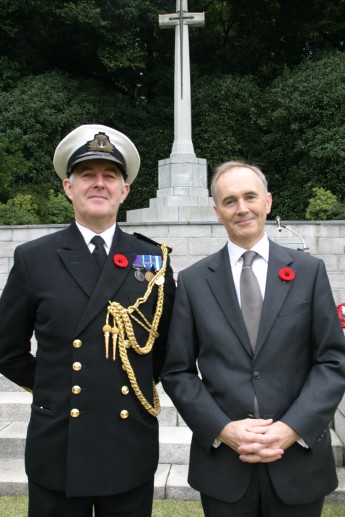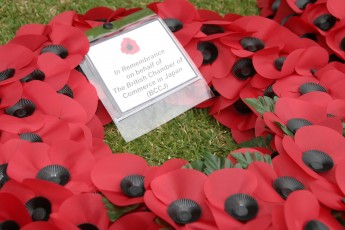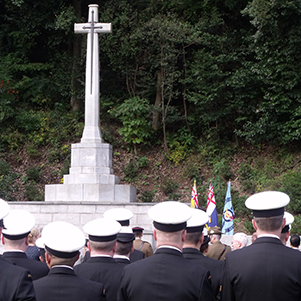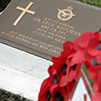Beneath leaden skies suitably reminiscent of Britain at this time of year, the always-poignant Remembrance Sunday ceremony was held at the Commonwealth War Cemetery in Yokohama on 10 November.
The New Zealand Embassy presided over this year’s memorial service, the only one of its kind in Japan.
Also present were representatives of the embassies of Britain and 16 other Commonwealth states— ranging from Fiji to Lesotho, Bangladesh to Nigeria—and the US.
The British Chamber of Commerce in Japan was represented, with Executive Director Lori Henderson MBE stepping forward to place a wreath of poppies before the Cross of Sacrifice in the cemetery.
Similar wreaths were laid on behalf of the Royal British Legion, the Royal Naval Association, the Royal Air Forces Association, the St. Andrew Society of Yokohama and Tokyo, St. David’s Society Japan and the British School in Tokyo.
As a long-serving officer in the Royal Navy, Captain Charles Ashcroft has attended numerous Remembrance Sunday ceremonies around the world, but the new defence attaché to the British Embassy Tokyo agreed that the Yokohama cemetery is one of the nicest sites he has ever visited.
“These are always very moving places, but I have been very impressed by the cemetery”, Ashcroft told BCCJ ACUMEN.
“Visiting a place such as this brings home just what a dreadful and violent time these people had to live in”, he said. “For those of us from Commonwealth countries, this is a time to reflect that our freedoms were won by the sacrifices that these people made.
“We should never forget the service they performed on our behalf”.
One effective way of visualising the scale of the loss of life, he said, is to imagine a man standing alongside every one of the 1,555 grave markers that are carefully aligned throughout the cemetery. That brings the names, ranks and numbers on the plaques to life, he explained.
Ashcroft started his career in the Royal Navy as a pilot flying helicopters for the Fleet Air Arm before going on to command HMS Manchester, a Type-42 missile destroyer, and then HMS Berkeley, a Hunt-class minesweeper.
He carried out minesweeping operations in the Persian Gulf in 1998 and 1999 and was involved in operations off the former Yugoslavia during the Balkan conflict (1991–1999).
He later attended the Royal College of Defence Studies and was seconded to the US Central Command in Tampa, Florida.
Ashcroft arrived in Japan with his family for the first time in August and will serve a three-year assignment focused in part on developing defence and security ties between the UK and Japan.
“There are all sorts of things that make us a good fit”, he said. “We are both island nations off a larger continent with which we have had a complicated historical relationship.
“We share the common values of democracy, an open society and hard work”, he said. “Most interesting for me are the relationships that go beyond the bilateral and bring in the US.
“Britain is re-expanding its interest in East Asia, and Japan is looking to broaden its partnerships around the world, and is taking more of an interest in shouldering the burden of ensuring international peace and stability in the future”, he said.
“That has brought us together and we can build on that now”.
The Sunday ceremony, however, was all about remembering the past.
Commemorative observances were read out by representatives of the Roman Catholic, Anglican, Hindu, Islamic, Jewish and Buddhist faiths, before Mark Sinclair, the New Zealand ambassador, read “The Fallen”, a poem written by Laurence Binyon that ends with the unforgettable line “We will remember them”.
To signal the end of the two minutes’ silence, Bugler Leading Seaman Mamiko Nishimura sounded “Reveille” before Frank Hunter played the bagpipes as the dignitaries placed their wreaths.
At the conclusion of the official ceremony, individual ceremonies were held at the national sections within the cemetery, with clusters of people walking quietly along the rows of grave markers.
The placards in the British section bear the names of some of our most famous regiments—the Gordon Highlanders, the Sherwood Foresters, the Bedfordshire Yeomanry, the Cambridgeshire Regiment—many with brief messages from loved ones written beside the names.
On the plaque marking the last resting place of RAF Aircraftsman W.J. Price, for example, is a message that reads, “For freedom, liberty and truth, he gave his happy youth. Dad.”
Price died in December 1942, aged just 20.





